I am using the 'html-pdf' npm package to create a byte array in a nodeJs azure function. I can log and see that the byte array is being created but when i call my function i cannot get the buffer to return. My response is a 200 and again i can see the buffer if i log it to string. For context the package takes an html string and returns a pdf .How do i set the response to return the byte array?
var pdf = require('html-pdf');
module.exports = async function (context, req) {
context.log('JavaScript HTTP trigger function processed a request.');
if ((req.body && req.body.data)) {
var html = req.body.data;
context.log(html);
console.log(html);
var data = []
pdf.create(html).toBuffer(function(err, buffer){
data.push(buffer);
context.res = {
setEncoding: 'binary',
// status: 200, /* Defaults to 200 */
body: Buffer.concat(data)
};
});
}
else {
context.res = {
status: 400,
body: "Please pass a name on the query string or in the request body"
};
}
};
